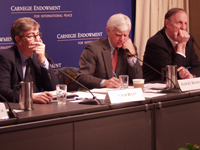Registration
You will receive an email confirming your registration.
IMGXYZ1110IMGZYXThe Chinese government recently released economic data showing that China’s GDP growth fell to 6.8% in the fourth quarter of 2008. Given that double-digit growth has become the norm for the East Asian powerhouse, many observers are wondering out loud – “Is China’s economy tanking?”
To address that question and the numerous issues that it raises, Carnegie assembled a distinguished panel: Pieter Botellier, an economist and China scholar who has served as a Senior Adjunct Professor at Johns Hopkins University’s School of Advanced International Studies since 1999; Donald Hanna, a Managing Director and Global Head of the Emerging Markets team in the Economic and Market Analysis department at Citigroup in New York; and Carnegie's Albert Keidel. Carnegie's Michael Swaine moderated the event.
Unemployment Challenges
Botellier noted that China’s slowdown began in the second half of 2007, well before the onset of the global economic crisis. He predicted that while China is unlikely to achieve double-digit growth rates in the near future because of large quantities of unsold real estate, it will avert economic collapse in 2009. Nonetheless, China faces serious challenges, particularly regarding unemployment:
- In 2008, 6.5-9.1 million migrants were laid off in coastal areas and industries. In total, 34-36 million non-agricultural workers (NAWs), representing 7-9% of the non-agricultural labor force (NALF), lost their jobs.
Nearly a third of university graduates (1.7 million out of 5.6 million) were unable to find work.
- In 2009, an estimated 47-53 million NAWs will compete for 6-7 million jobs in the non-agricultural sector.
By the end of the year, 35-50 million workers could be unemployed out of a total NALF of 500 million people.
The Chinese government has taken several steps to mitigate unemployment and revive growth: reducing lending rates, facilitating the ability of small and medium enterprises to access capital, increasing recurrent budget expenditures for social programs, extending rural land use rights, and increasing pension benefits for retirees whom the national pension system covers. As it fights recession, the Chinese government is also aiming to rebalance China’s economy, which, Botellier argued, has become overly dependent on capital formation and export-led growth. He concluded his remarks with a round of predictions:
- The current recession in China will bottom out in the second or third quarter of 2009.
- GDP growth in 2009 will not fall below 7%.
- If the United States does not incline towards protectionism, China will remain committed to the principles of the World Trade Organization.
China's Economic Fundamentals
Whereas Botellier presented a high-level overview of China’s economic challenges and prospects, Hanna offered a more in-depth perspective on its economic fundamentals. America’s economic health is essential to China; a one-percentage-point decline in American growth would result in a 1.3-percentage-point decline in Chinese growth.
Hanna noted that many who are pessimistic about China’s growth prospects point to its rapid slowdown in industrial production (particularly in heavy industry) and power generation in the country, as well as the drops in the Consumer Price Index and Producer Price Index. A collapse in Chinese exports could produce deflationary risks.
Paradoxically one of the main weaknesses of the Chinese economy – the degree of state control over it – could expedite its recovery. The state still contributes 43% of fixed asset investment and 60% of total banking assets. Because it wields disproportionate influence, it can compel the drivers of China’s economy to adopt heavily growth-oriented policies. In doing so the government runs the risk of reversing the market-oriented reforms that have helped the economy prosper. Hanna concluded with predictions for the new year:
- Chinese growth will achieve a soft landing.
- Deflation will occur, thereby harming corporate earnings.
- Outward investment will surge in 2008, especially in commodity and financial sectors.
Breaking Down the Numbers
Keidel concluded the morning by breaking down the growth data. Although China’s growth decline does not appear overly pronounced when examining year-on-year numbers – it fell from 13% in 2007 to 9% in 2008 – it is quite alarming from a quarterly perspective: Chinese growth fell from 13.8% in the second quarter of 2007 to 6.8% in the fourth quarter of 2008.
He explained that three factors account for this decline, the third of which has not received as much attention as the first two:
- The global financial and economic crises
- Overreaching counter-inflationary policies that the Chinese government adopted in December 2007
- The closure of export-oriented plants in Guangdong Province that have been responsible for high levels of pollution.
Keidel revealed some surprises in the numbers: notably, that primary sector growth exceeded secondary sector growth in the fourth quarter of 2008, and that rural incomes declined by more than 5%.
He concluded by discussing major uncertainties for China in 2009, including the severity of its trade slump and the responsiveness of household consumption to the government’s stimulus package.
Question & Answer The question-and-answer period addressed a wide range of topics, including Secretary of the Treasury Tim Geitner’s contentious remark that China is manipulating the yuan; the likelihood of the Obama administration’s pushing the United States onto a protectionist course; the prospects for long-term unemployment in China; and the reliability of Chinese data.
